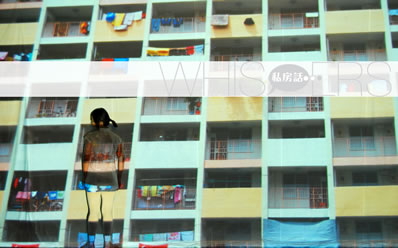Whispers So Slight
It was a shame that the three women were never very involving, lacking relational intimacy or the expressive nuances that can shift archetype away from stereotype.
With a Chinese title like Si Fang Hua, or "private words", one might expect startlingly intimate revelations or that unpleasant truths would be uncovered. True to this formula, we entered the theatre studio fumbling our way in the dark, with the shadowy presence of the actresses serving as haunting indicators of what was to come. However, this was as portentous as the play got: its tone never progressed much beyond the flat middle line of safe idiosyncrasies.
This was a play which promised to reach into the depths of the female psyche, bringing together women from different times and circumstances, and exploring their intergenerational relations. There were three unnamed but representative women in this play: one hailed from the past, a feisty early migrant from China who nonetheless adhered to customary practices and obligations (played by Tan Beng Tian); another epitomised the contemporary, independent, liberal woman (Jo Kwek) faced with the peculiar problem of having an excess of choice, romantic and otherwise; and the third was torn between her responsibilities as a homemaker and her desire for a career outside the domestic sphere (Koh Leng Leng). Koh's character was possibly the most socially grounded: we saw her take furtive pleasure in an occasional cigarette as a respite from her demanding, chauvinistic husband; but then she unleashed all of her anxieties after her child went missing, ostensibly due to her negligence. In comparison, Kwek's role was to play the chameleon, flitting from place to place, from one burst of emotion to another. Tan was yet another model figure of a traditional, modest, earthy and contented wife who willingly endured hardship.
It was a shame that the three women were never very involving, lacking relational intimacy or the expressive nuances that can shift archetype away from stereotype. We were mostly goaded into believing that supportive camaraderie is the fount of female relationships - but I would have appreciated a more trenchant engagement with conflict, which was only summarily touched on. No character here was particularly transgressive or clued in to the more pressing issues of the day. Part of the problem was the play's non-committal line of articulation (and, for that matter, acting). The lines were evocative but no more than that - and the blame for this has to be laid at the door of the scriptwriters, Tan Chee Hon and Ong Kian Sin. So democratic was the play - so encompassing was it of the various experiences of its cast and crew - that the director and playwright forgot to forge their own path. Sure, two motifs of masks (mian ju) and departures (chu zou, the stepping out of one's home ground) undergirded much of the play. But for a production which valorised non-conventional devices and non-linear open-endedness, Whispers presented these motifs almost too literally, subscribing to the trite notion of women performing many parallel roles and making path-breaking inroads. And the play never explored why many women choose to remain within the status quo rather than leave "to draw their own maps with their feet". Even so, did these three women who ran away from home really "march to a different beat"?
Some moments were confusing. There were occasional awkward breaks in the actresses' characterisations, and then they would explode in a heightened frenzy of exaggerated theatrics – after which sudden rupture one of them would announce: "The director asked me to do it". It was unclear what was meant by this: was it a simple distancing device, or was it supposed to show the director's trumping of female agency? Or was it that the director wanted to show that feminised hysteria is merely a manufactured outcome?
This is not to say that Whispers was not compelling in other ways. At the start of the play, I had thought it to be a treatment on memory, or, more specifically, on how we remember the deeds of the women who have gone before us. When, near the beginning, Beng Tian intoned "We laid our roots here with time. We settled in and our whole life passed us by", we may not yet have had a narrative arc, but certain of the actresses' gestures and also the stage set were ripe with suggestion. Shaped like an infinity symbol (a vagina to the director and a uterine environment to others), the central undulating stage ramp was embedded with trapdoors that led to subterranean storage cavities; things were taken out and put back in again.
I also wondered if the play would have worked better if it had desisted from plugging women's issues and had rather concentrated on provocation through abstract physicalisation of the different specificities of the female body. Indeed, where it succeeded most was in the stylistics of its presentation: the weaving in of parallel narratives via folkloric puppetry, mask play and interactive sound design. But the results of all this were arresting visual tableaux that said very little about what it means to be a woman.
The play ended on a cryptic but ultimately delusory note as the women shed their clothes to journey to a place where there is "no more hatred, no more problems". With all of the women's movements up and down the ramp, they became for me merely animate structural objects. The men at the helm of this production may have maintained too much of a respectful distance from the fairer sex to risk defining a version of womanhood that might provide some novel answers for the uncertain times ahead.
